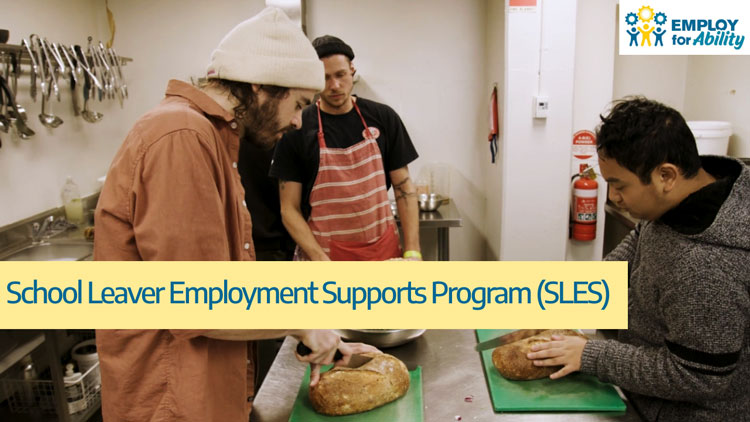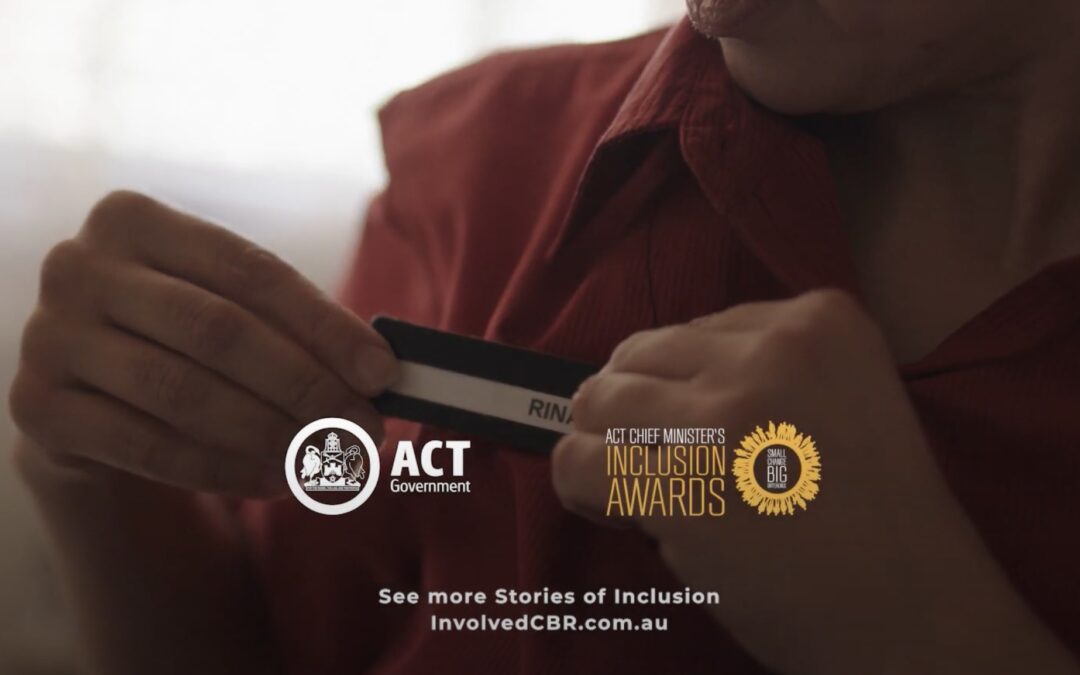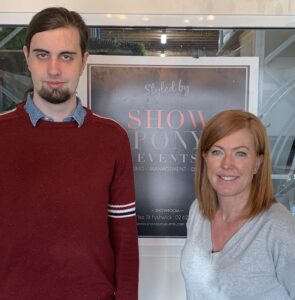
School Leaver Employment Supports Program (SLES)
Our SLES Program is designed to help young adults with an autism diagnosis (or other neurodivergent conditions) become job ready.

Our SLES Program is designed to help young adults with an autism diagnosis (or other neurodivergent conditions) become job ready.

The Chief Minister’s Inclusion Awards acknowledge the outstanding achievements of business, organisations and individuals who have clearly demonstrated their commitment to encourage, welcome and support people with a disability in their workplace, business and community.
They have commenced the release of a series of videos, each with a specific theme which align with Inclusion Awards categories and highlight great examples of progress make toward better inclusion in our community.
The videos focus on celebrating the good and positive stories which have emerged since the beginning of the COVID-19 Health Emergency. Celebrating inclusion in our community rather than awarding individuals and organisations.
This is the first video in a series of stories that highlight inclusion in the Canberra community – Rina’s Story
Following years of volunteer and unpaid work Rina has now secured a permanent part-time position which she describes as her dream job thanks to ‘Employ For Ability’.
David Smith for Employ for Ability – Linkedin + Facebook
An autism and neurodiversity employment specialist and advocate.
Working for the last 20 years in the recruitment sector coaching and mentoring clients, candidates and staff to reach their potential.

Interviews are one of the most commonly used recruitment techniques by employers to determine the most suitable individual for an advertised role. A successful interview requires appropriate social and communication skills and confidence to progress to the next stage of the hiring process. For many, interviews can be anxiety-provoking to some extent, although still manageable. For individuals with an autism spectrum disorder (ASD) diagnosis, the anxiety that is produced by a generic interview is tenfold. Autistic individuals may experience difficulties with social and communication skills and interpreting nonverbal cues, therefore, approaching an interview is more difficult without alternatives or adequate skills to manage the situation, and thus, creating an initial barrier to finding employment.
“Sometimes (we) miss out on good opportunities because someone less capable presents better in an interview. I have to work harder and achieve more to reach the same level as people with better social skills” Disability Supports Coordinator, Australia (ERE, 2019)
Studies suggest that the transitional period from adolescence to adulthood is a time of increased depression and anxiety contributing to the high rates of unemployment in individuals with ASD (Payne, 2016). Having adequate skills to communication during an interview is likely to increase confidence, but what happens if you have a negative experience in an interview? The effect of a negative experience with an interview is likely to decrease self-confidence and further hinder finding employment opportunities. A large proportion of the ASD population in Australia are unemployed with the most common barriers involving a lack of support and the inability to attend interviews.
Changing the environment of the interview, whether it’s a different recruiting process or accommodating the individual with a familiar, comfortable environment and questions they can answer is crucial. Many studies include work experience and internships as an effective means of determining the right fit for a job and an alternative to the traditional interview model (Wehman et al., 2012). An interesting quote from Bill Wong, an autistic occupational therapist represents this idea well. “For autistic individuals to succeed in this world, they need to find their strengths and the people that will help them get to their hopes and dreams… A supportive environment where they can learn from their mistakes is what we as a society need to create for them.” (The Art of Autism, 2020).
Creating environments where individuals with ASD can thrive in an interview setting and workplaces that fit their areas of interest is necessary. Although these individuals experience difficulties with social and communication skills, they often have high levels of organisational skills, concentration and attention to detail. Stereotypically, individuals with ASD may not seem like an appropriate fit for a job, but the reality is they have many skills to offer in environments that cater to them.
“Our lack of interview skills does not necessarily mean we lack job skills.”
Software Tester, USA (ERE, 2019)
Giving autistic individuals the opportunity to display their skills and abilities in an environment that supports them should be the main focus of the recruiting process. Some ways to accommodate these individuals is swapping an interview for work experience or trials where they can display their skills in a practical way. Allowing the individual to demonstrate their skills while being observed may be a better predictor of their suitability for the job rather than an attempt to articulate their skills in an interview. Series of online psychometric testing may also be a more appropriate way of testing suitability for a job and an alternative to demonstrating their skills.
If an interview has to occur, how can it be made easier for the individual? Allowing the interviewee to bring a support person along may be beneficial to reduce anxiety and assist with better communication. Giving the individual prompts or leading with previous employment experiences may be more beneficial than asking abstract or general interview questions. The interviewer may also want to give the individual clear guidelines of what the interview will consist of, to better prepare them. One of the most important things a manager or recruiter can do is being flexible and understanding that an individual with ASD will likely need accommodations to some degree.
Finding alternatives to the traditional interview model is an essential step for improving the employment rates of individuals with an ASD diagnosis. Studies have shown work experience and internships are more effective ways of displaying skills rather than an interview which relies on verbal communication. As we know, individuals with an ASD diagnosis have increased difficulties with social and communication skills. Observation, work trials and psychometric tests have also been proven to be effective measures of suitable skills. If interviews are the only option in a recruiting process, accommodating for the individual by asking specific rather than abstract questions, allowing them to bring along a support person and accommodating any needs they may have should be the focus.
This article was created by Elise Bulless as part of her Internship at Employ for Ability.
Elise is in her final year of a Bachelor of Science in Psychology at the University of Canberra.
David Smith for Employ for Ability – Linkedin + Facebook
An autism and neurodiversity employment specialist and advocate.
Working for the last 20 years in the recruitment sector coaching and mentoring clients, candidates and staff to reach their potential.
I am really proud of the achievement of my client Thom, who was offered a role with Show Pony Events today.
A big thank you to Jillian Hart (MD of Show Pony Events) who understands the value staff of different abilities can provide to her organisation and clients.
Thom is studying Music production at CIT and has experience through his study of many of the aspects required for a role in the events management industry. Jillian understands that staff who are neurodiverse may not interview the same as other workers but have the ability to be productive members of her team. her business is leading the way demonstrating that inclusion adds value to your team, clients and business.
Thom is the 47th person on the Autism Spectrum I have assisted to find meaningful employment.

David Smith for Employ for Ability – Linkedin + Facebook
An autism and neurodiversity employment specialist and advocate.
Working for the last 20 years in the recruitment sector coaching and mentoring clients, candidates and staff to reach their potential.

Autism and neurodiversity are often used interchangeably. Autism is a diagnosis and neurodiversity is a social term used to demonstrate the value of people with this diagnosis. Organisations are starting to learn that hiring people with neurodiversity can create incredible value.
Autism Spectrum Disorder (ASD) is the clinical term used to diagnose somebody who has impairments due to challenges with social communication and interaction, as well as restrictive and repetitive behaviours, interests or activities as outlined in the Diagnostic Standards Manual (DSM-5) (American Psychiatric Association, 2013). It replaces a range of diagnoses in the DSM-IV, that included Autistic Disorder, Asperger’s Disorder and Pervasive Developmental Disorder – Not Otherwise Specified (PDD-NOS) (American Psychiatric Association, 2000).Medical V Social
These medical terms, including the word disorder, have a very negative meaning for people who are on the spectrum and imply disability. The medical view of disability is we try to cure or fix people who have a medical problem. People are disabled due to their medical impairments. Another view is the social model of disability. The social view is that society causes a person to be disabled due to barriers we put in their way. Barriers are not just physical but include attitudes and stereotypes. if you ask most people who are on the spectrum, they will not consider themselves to be disabled.
A great term that reflects the social view of autism is neurodiversity. The term neurodiversity is attributed to Judy Singer an Australian social scientist who used the term in her honours thesis. It is used to demonstrate that many people with autism are neurologically different and do not see themselves as disabled. It is controversial in that it does not reflect the lived experience of those people with high support needs, it generally applies to people with ASD Level 1 and 2.
Why I like the term neurodiversity over ASD in an employment context, is that it demonstrates to society and potential employers that these candidates have a different perspective or way at looking at their life compared to a neurotypical person. Neurotypical is a great word in this context, as normal implies the other person is not normal. What is normal anyway? Normal is a word to describe a standard or an average of society that is typical. If people on the spectrum have a label, then the label for people who are not on the spectrum who are neurologically typical is neurotypical.
All modern workplaces accept and understand that diversity outlines that we are all unique individuals. Individuals who look different, have different backgrounds, beliefs and perspectives. This diversity provides advantages to organisations who fully implement diversity programs. The goal of diversity programs is ultimately inclusion in society for all people. Yet diversity programs are only just realising that diversity needs to include diversity of thought. This is not something new, we have been testing our staff for years using Myers Briggs, DISC, HEXACO, NEO and many other profile tools. People like to label themselves as being a certain “type” and many people still read their horoscopes. So why is it a big leap to accept that if we are different and have different personalities then we may think or be different neurologically. Neurodiverse.

Implementing neurodiversity programs can be done for altruistic reasons. After-all, it is a good thing to do. But in business, doing something different needs to create value and be sustainable. A key understanding, I learnt from my previous CEO (Peter Acheson) is that for a business to fully embrace a new program it needs to be sustainable and create value for all parties. It needs to provide value to the existing staff members (neurotypical and neurodiverse), provide value to the new staff that are neurodiverse, provide value to the clients who buy your services and create value for the shareholders. In that order. Happy engaged staff create happy engaged clients, that create happy and engaged shareholders.

Neurodiversity programs do just that, they not only feel good to do, they create good sustainable outcomes. The evidence is there in Australia and overseas. Programs runs by Specialisterne, Xceptional, Federal Government, large and small companies are demonstrating the abilities that hiring neurodiverse staff provides. New staff with neurodiversity work hard, develop new ideas, solve difficult problems and work just as well as existing staff, usually better. Neurodiversity programs have other benefits to organisations. They support existing staff with neurodiversity, it shows neurotypical staff the company is fully inclusive, and it creates better leaders and managers. Leaders who understand that all staff are unique and when managed well can create improved value for themselves, their clients and the organisation.
The key to undertaking a neurodiversity program is learning about autism. Managers may think that hiring someone who is on the spectrum will make their lives harder. It is no different to managing any other staff member. Current programs are showing that turnover of staff in neurodiversity programs is significantly lower than hiring neurotypical staff. Working with a good neurodiversity partner can overcome this concern and allow your organisation the benefit of creating a fully diverse and inclusive team that will create value.
David Smith for Employ for Ability – Linkedin + Facebook
An autism and neurodiversity employment specialist and advocate.
Working for the last 20 years in the recruitment sector coaching and mentoring clients, candidates and staff to reach their potential.

Neurodiversity rates in Australia are growing as the number of young people receive a diagnosis through improved intervention and school inclusion programs. All young people will eventually finish school and transition into adulthood. These school leavers have the same goals, dreams and hopes about the future as we did. However, today school leavers with neurodiversity will experience the highest rates of unemployment compared to any other group of people with disabilities.
In Australia, according to the latest ABS statistics, 40.8% of people of working age (15-64) with autism participate in work (more than 2 hours per week). 53.4% of people with any other disability participate in work and 83.2% of people without a disability participate in work. It is harder to get work if you have autism or neurodiversity than any other disability.
While these stats show a very big problem, one statistic is improving. 35% of young people with autism on finishing school are entering tertiary education. The challenge is how do we improve the employment rate for people with autism and neurodiversity? The education system is improving the educational outcomes for people with autism. It is time for the employment sector to step up and help improve the employment outcomes for this cohort of people that is being left behind. As Dr Paul Shattuck found, as children with autism receive improved levels of support through intervention programs and inclusive education practices, they can achieve higher levels of academic achievement. ANU, UC and CIT in Canberra, as well as many other tertiary education institutions have created specialised support programs for their neurodiverse students. These tailored programs are improving the education outcomes for their students.

Hiring based on an interview for cultural fit has led to the above statistics on under-employment for people with neurodiversity. Interviews measure a person’s communication and social skills, areas that someone with autism may have difficulty understanding. For someone with autism, an interview can cause debilitating anxiety and more often they will associate interviews with a negative perception of the organisation. Yet autistic people are good workers who are demonstrating amazing skills that an employer needs to be competitive in their markets. Recruitment programs that assess a candidates strengths and job fit, using testing, assessment centres and work experience are having vastly improved outcomes compared to traditional interview methods. With some simple modifications to employment methodologies, awareness training and leadership support, we can improve the employment rate of people with neurodiversity and provide competitive advantages to organisations.
Autism employment programs such as those provided by Specialisterne in Government departments (Department of Human Services, Australian Taxation Office, Department of Home Affairs, Australian Bureau of Statistics, Victorian Government) large corporates (Sun Pork, Westpac, IBM, SAP) and technology firms (Seeing Machines) demonstrate that employers are starting to understand that people with autism can be professionals and forge a career rather than working in roles below their education level. Employers need to understand that the pathway to employment for someone with neurodiversity is different to the traditional recruitment model.

Neurodiversity employment programs need not be just about disability employment. All employees need to demonstrate value, and help the organisation achieves its goals. People with neurodiversity offer competitive advantages over neurotypical employees and they want to contribute to an organisations success by adding value. These include:
Individuals with neurodiversity often dislike change and may stay in the same role or organisation for longer periods than neurotypical employees if the work and environment are good. People with neurodiversity have a reputation for focus, attention to detail, accuracy and an ability to concentrate for longer periods of time than neurotypical workers. They often do not engage in office politics, banter or socialising, they just want to complete the task allocated. Examples now exist on the programs mentioned above where the neurodiverse staff are outperforming their neurotypical co-workers.
Other benefits will be found to existing staff through feeling a sense of pride that their organisation has invested in hiring people with lower employment outcomes. With the incidence of autism diagnosis increasing, many families have a connection to autism. Programs to support neurodiverse workers may also support staff experiencing anxiety, depression and other neurological conditions. Leaders learn how to manage people’s personalities and different ways of thinking. Managers often performance manage someone who is different or difficult. With a small amount of training, managers can dramatically improve their leadership and management skills. Learning how to harness the problem-solving skills of neurodiverse workers and handle the direct way someone may speak or their poor social skills, makes good leadership and business sense. This is inclusion at its simplest level.
With some simple modifications to employment methodologies, awareness training and leadership support, we can improve the employment rate of people with neurodiversity and provide competitive advantages to organisations.
David Smith for Employ for Ability – Linkedin + Facebook
An autism and neurodiversity employment specialist and advocate.
Working for the last 20 years in the recruitment sector coaching and mentoring clients, candidates and staff to reach their potential.